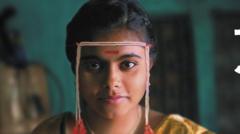In 2024, Indian cinema witnessed a transformative surge, with female-directed films like Payal Kapadia's All We Imagine As Light dominating global film festivals. Their exploration of universal themes and women's narratives sparked a new interest in Indian storytelling on the international stage, suggesting a significant cultural shift.
Indian Cinema's Feminist Wave Captivates Global Audiences in 2024

Indian Cinema's Feminist Wave Captivates Global Audiences in 2024
As Bollywood searches for its footing, female-driven indie films gain international acclaim, redefining India's cinematic narrative.
In 2024, as the traditional Bollywood industry faces challenges, a remarkable array of independent films led by talented Indian women filmmakers has emerged, captivating audiences both domestically and worldwide. Leading the charge is Payal Kapadia’s poignant film, All We Imagine As Light, which secured the prestigious Grand Prix at the Cannes Film Festival this May. Following its success, the film has taken the indie circuit by storm, garnering accolades as Best International Film from elite critics' associations like the New York Film Critics Circle and the Toronto Film Critics Association, alongside two Golden Globe nominations.
This surge isn't an isolated incident; other notable films include Shuchi Talati’s Girls Will Be Girls, which claimed two awards at the Sundance Film Festival, and Kiran Rao's Laapataa Ladies, which despite mixed box office results, thrived in critical circles and represented India at the Oscars. British-Indian director Sandhya Suri's Hindi thriller Santosh also made its mark, being selected as the UK's official Oscar entry, emphasizing the growing recognition of diverse narratives in Indian cinema.
The newfound success of these films reflects a long overdue reckoning in cinematic storytelling. Critic Shubhra Gupta suggests that this wave represents both a culmination of years of effort and a timely cultural awakening. Talati’s Girls Will Be Girls, for example, draws on personal experience; it encapsulates the struggles of adolescence and the complicated relationships between mothers and daughters, depicting female narratives with unprecedented empathy and depth.
Kapadia’s All We Imagine As Light delves into the lives of three migrant women in Mumbai, exploring themes of emotional connection against a backdrop of socio-political challenges, particularly regarding interfaith relationships. Kapadia articulates her views on love and its implications for women in India, underscoring the restrictive realities certain choices impose.
Kiran Rao’s Laapataa Ladies, a satirical take on gender roles and societal constructs, has also stirred conversation. Even as it faced critical scrutiny in box office performance, its message resonated, showcasing how female creatives are steering narratives away from the male-centric stories traditionally dominating Indian cinema. Moreover, Bollywood stalwart Aamir Khan emphasized the necessity for a collective evolution in mindset during a screening, advocating for a deeper understanding of gender roles in contemporary narratives.
With Santosh’s reception, we see an example of cross-border co-productions that not only enhance the film's appeal but also promote a broader cultural exchange. Actor Shahana Goswami, who stars in the film, highlights how emotionally driven narratives can transcend geographical borders, making a universal impact.
Interestingly, even within Bollywood's commercial space, films led by women gained traction, such as Stree 2, which topped box office charts, and Sanjay Leela Bhansali’s Heeramandi, which gained massive popularity on streaming platforms. Their success signals a burgeoning demand for stories that tackle complex themes without compromising the essence of entertainment.
The momentum experienced in 2024 emphasizes the transformative power of female voices in the Indian film industry, advocating for a richer, more inclusive cinematic landscape. This shift, driven by diverse storytelling, portends a promising future, potentially leading to broader distribution for independent films and an enriched global dialogue on women’s experiences and narratives in cinema.





















